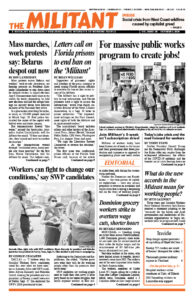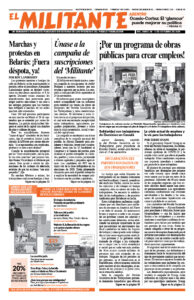October 9, 1995
UNITED NATIONS — “Cuba will never give up in the face of threats, and it will survive in any case, as there are always ways out of a crisis, but not from the dishonor of living on our knees.”
In his address before the UN General Assembly, [Cuban foreign minister Roberto] Robaina blasted efforts to pass legislation in the U.S. Congress that will significantly tighten Washington’s economic embargo of the Caribbean nation.
Robaina was referring to legislation introduced by Rep. Dan Burton and Sen. Jesse Helms. On Sept. 21, the House of Representatives passed the bill by a bipartisan majority of 294 to 130. The legislation will be discussed next in the U.S. Senate.
As that debate continues, opponents of Washington’s economic war against Cuba who support Cuba’s sovereignty and independence will hold rallies and marches.
October 9, 1970
SEATTLE — The strike of migrant hop workers in the Yakima Valley is scoring victories. The ranchers attempted to use high school students as scabs, but when this supply of strike breakers ended, the Yakima Chief ranch signed a contract setting a minimum wage of $2 and recognizing the workers right to form a union. Other ranches have also begun to capitulate.
The role of Chicana women has been very significant in this strike. With the involvement of new forces the hop strike will have far-reaching effects.
The strike has proved that people have power when they organize. The Yakima strikers accomplished in one week more than they did in years of waiting for the system to respond. Francisco Salinas summed it up: “Once the people see their power they’ll want to form their own independent organization.”
October 6, 1945
Thirty thousand Australian dock workers have struck in support of Indonesian Nationalists. The stoppage was called in sympathy with Indonesian crews who refused to sail ships for the Netherlands East Indies [now Indonesia] loaded with military supplies for use against the independence movement.
Sydney dock workers demonstrated in support of the Indonesian Nationalist “struggle for independence.” Thirty banners were carried among a crowd of 3,000 bearing such inscriptions as “‘Hands Off Our Allies, the Indonesians,’ and ‘Down With Dutch Imperialism.’”
In Batavia [Jakarta], 10,000 Indonesian Nationalists held a mass rally demanding independence. Pamphlets distributed said, “We don’t want to be ruled by the Dutch.” Tramcars bore roughly painted slogans such as: “Better to Hell than Be Colonized Again.”

